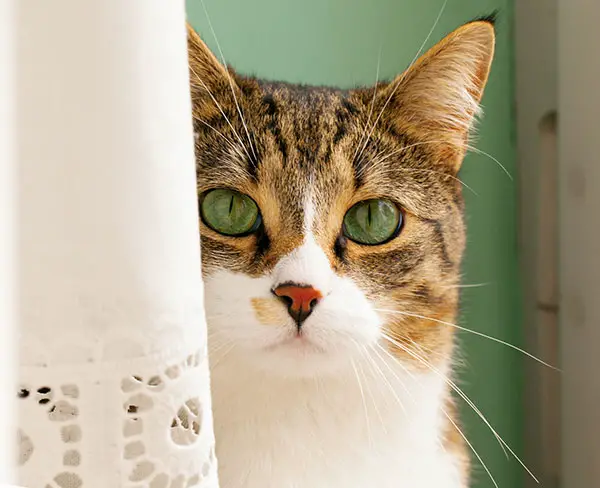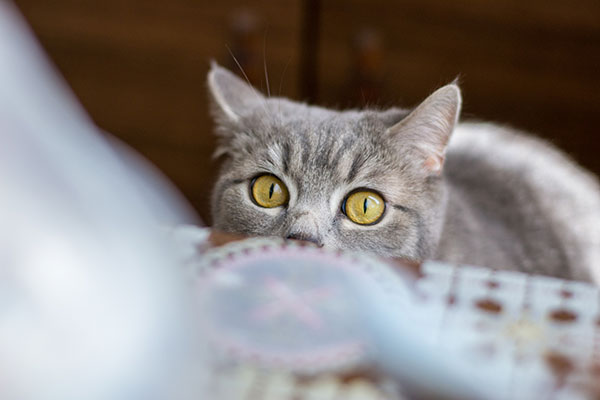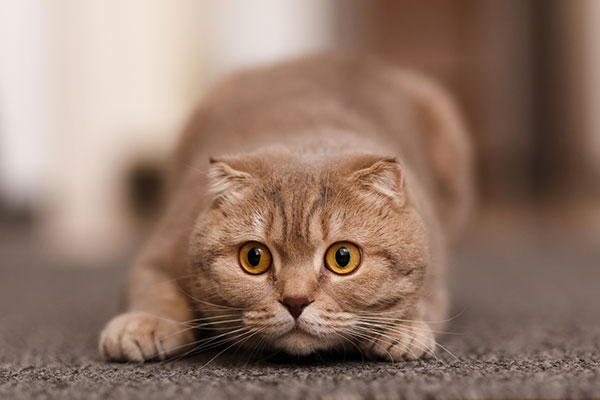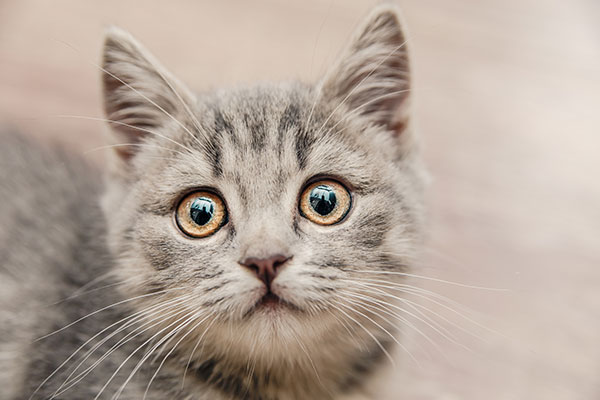Picture this!
You’re interacting with your cat normally. Then all of a sudden, the animal leaps a few steps away from you, freezes in a playful pose, and stares directly into your eyes.
As you draw closer to the cat, he suddenly darts away from you, perhaps stops after a short run to look back, hoping that you’d give chase. In some instances, the cat may even meow at you or make other vocalizations as a way of complaining why you didn’t go after him.
Now, if you’ve owned a cat long enough, you’ve probably had numerous experiences where your cat behaves in a manner that suggests he wants you to chase after him.
To most cat owners, this behavior may not immediately come across as odd. After all, cats are highly playful animals and most of them delight in playing with their owners. Still, you can’t help but wonder whether cats love to be chased or not. So, if this behavior keeps happening, you may find yourself wondering, do cats like when you chase them?
The short answer is yes, cats love being chased. In most cases, cats love it when they’re chased by other cats or their human parents. And that’s especially when treats are involved. Chasing your cat stimulates the animal’s play instincts.
But as you shall find, you should exercise caution while chasing your kitto. That’s because some cats might interpret chasing as an aggressive behavior. When that happens, the cat may become frightened, anxious, or withdrawn from you. Read on for more insights on this topic.
Table of Contents
Why Do Some Cats Like To Be Chased?
The primary reason many cats like to be chased is that it stimulates their play instincts.
Like most pets, cats generally play by darting around. This phenomenon is simply known as playing chase or play chasing.
Cats that love play chasing might even attempt to invite you to join in the chase. You may notice that the cat freezes and makes eye contact with you. But as you try to approach him, the animal darts around in short bursts, then stops and looks back to check if you’re following.
Pausing and waiting for you to catch up makes the playtime all the more exciting. Some cats may even complain by meowing at you or making other vocalizations if they sense that you’re not following along. They could also hide in the next room or behind a post to entice you to go looking for them.
Cats that enjoy playing chase will attempt to do anything within their power to encourage you to join in the action. Basically, these cats treat you in the same manner they would treat other cats.

The following are other reasons why some cats love to be chased;
1. It improves their agility
It’s worth noting that even before domestication by man, cats loved to play with their own kind in the wild. Chasing and play-fighting was an excellent way to pass time. It also allowed cats to bond with one another and establish social hierarchies.
Most importantly, play chasing improves cats’ reflexes and makes them more agile. It was, therefore, an excellent strategy of honing their hunting and self-defense skills.
Of course, there are fewer and less dangerous predators to hunt at home. Still, a cat will have you chase him if he believes that doing so helps him improves his agility and reflexes.
2. It stimulates them
Another reason cats may love being chased is that it stimulates them. This is particularly common among cats that do not receive enough physical or mental stimulation.
It’s important to remember that cats are generally active pets. And while they spend up to two-thirds of their time sleeping, much of the remaining one-third is spent grooming and prowling.
Its, therefore, necessary to ensure that your cat gets proper stimulation during his waking hours. The good news is that there are plenty of ways to keep your cat stimulated. Much of that in the next section.
- INTERACTIVE TOY FOR CURIOUS CATS – Cat Amazing’s Shark Tank-famous & award-winning puzzle box is designed to stimulate and...
- ENCOURAGES NATURAL INSTINCTS – Stimulate your cat's natural foraging instincts to explore, scratch, sniff and retrieve hidden...
- STRESS AND BOREDOM BUSTER – Our puzzle cat toy is sure to pique your cat’s curiosity as it works with their favorite treats,...
Last update on 2025-03-12 / Affiliate links / Images from Amazon Product Advertising API
Do Some Cats Enjoy Chasing More Than Others?
Yes, some cats do enjoy play chasing compared to others. It all depends on a variety of factors, including the age and breed of the cat, as well as the number of cats in your house.
i. Age
Younger cats are generally more active and playful than adult cats. As cats age, they become more passive and withdrawn. So, all other factors held constant, kittens are more likely to enjoy play chasing compared to adult cats.
However, inactivity among adult cats isn’t something to be taken lightly either. That’s due to the numerous inherent risks associated with sedentary lifestyles, such as obesity, diabetes, hypertension, heart disease, and bone & muscle degeneration.
Therefore, you should ensure that your cat gets his fair share of physical activity, regardless of his age.
ii. Breed
Certain cat breeds are more active than others. And as we’ve already highlighted, active and playful cats are generally inclined towards play chasing.
The following are some of the top cat breeds likely to be more receptive to play chasing;
- Abyssinian
- Japanese Bobtail
- Siamese
- Bengal
- Maine Coon
- Devon Rex
- Munchkin
- Manx
- Siberian Forest
- Turkish Angora
iii. The number of cats in your house
Cats are naturally given to play chasing amongst themselves. That’s especially if they get along.
Generally, cats born from the same litter tend to get along. The same goes for cats of opposite genders.
If your household comprises more than one feline member who get along, you’ll notice a lot more play chasing amongst the cats themselves. But if your kitto is an only-cat, he will mostly want to play chase with you.

Should You Chase Your Cat?
We’ve already highlighted the primary reasons cats love play chasing. However, you could still be wondering, is it okay to play chase with your cat?
The answer to that question can be a ‘yes’ or ‘no.’ It all depends on whatever you aim to achieve by play chasing your cat.
It’s okay to play chase your cat if you’re doing it to tire the animal down and help him release his pent-up energy. The only problem here is that the cat may never be able to engage in any meaningful physical activity without input from you.
Another reason you might consider play chasing your cat is that it strengthens the bonds of love and affection between the two of you. Quality time spent with your cat will invariably help to foster a deep emotional connection with the animal.
Play chasing is also an excellent way of socializing your cat. It allows the cat to relate better, not only with other members of the household but also with your visitors.
But before you go play chasing your cat, it’s important to study the animal keenly and establish whether he enjoys this kind of interaction.
As you shall find, some cats may not fancy being play chased. Much less if the chasing is done by a human and not another cat. Even worse, some cats may interpret play chasing as aggressive and confrontational behavior.
When a cat believes that you’re being overly confrontational, he may not run in short bursts, as is often the case. Instead, the animal may sprint and hide in order to escape from you. And if you happen to be blocking the cat’s only escape route such that he feels cornered, the animal may inflict grievous bodily injuries on you in an attempt to escape.

As a responsible cat owner, it’s important to take note of any sign that indicates your cat is anxious, tensed, or frightened. Some of those signs include;
- Freezing in place
- Piloerection, or the standing up of hair
- Swatting or pawing in the air
- Staring directly into your eyes
- Excessive vocalization, such as hissing and growling
- Excessive spiting
- Biting and scratching
If you notice any of the above signs, it’s advisable to back away from the cat and allow the tension to diffuse.
It’s also important to understand the history of a cat before chasing him. That’s especially true for a cat that you acquired from a rescue shelter, who might have an undocumented history of trauma, abuse, or neglect. Such cats may not necessarily interpret chasing as an invitation to play. Instead, they may think of you as a threat and react defensively.
Generally, the best cat to chase is a high-energy cat that shares a close bond with you. But even then, you must go slow on play chasing to establish whether the cat is enjoying the action or not. That means taking note of the cat’s social cues.
Also, don’t overdo it. As you chase your cat, watch for signs of overstimulation and stop immediately. Some of those signs include open-mouthed panting, fatigue, anxiety, irritability, and aggression.
Most importantly, never chase your cat if doing so only ends up scaring the animal. In other words, never ambush or startle your cat as he may feel frightened and react aggressively. Remember that cats look to their owners for safety and security. So, scaring your cat may push the animal away from you as opposed to drawing him closer.
Do Cats Like To Be Chased By Dogs?
Throughout this post, we’ve attempted to answer the question, ‘do cats like being chased by humans?’ We’ve discovered that most cats love play chasing, whether it’s done by fellow cats or their human parents.
But you might also be wondering if cats fancy being chased by dogs.
Now, cats and dogs generally don’t get along. So, your cat may not like the idea of a dog chasing him.
However, certain situations may make it easy for your feline and canine members of the household to get along just fine.
For instance, a cat will readily play with a dog if the cat is relatively larger than the dog. That’s especially true for households with larger cat breeds like Maine Coon but smaller dog breeds like Boston Terriers. When your cat is the larger animal, he’ll feel less intimidated by your dog and more willing to play together.
Another situation that could make your cat comfortable with your dog is if the animals are adequately exercised and well-socialized. That means offering both animals enough toys of their own to eliminate potential bones of contention, so to speak. It also includes offering each animal his own playing patch, feeding area and time, grooming/petting time, and sleeping time.
Most importantly, you should introduce the animals properly with one another during their initial encounters. That will enable them to appreciate the fact that they belong to the same household and, therefore, can play and spend more time together.

What Can You Do To Stop Your Cat From Getting You To Play Chase Him?
As we already pointed out earlier, playing chase with a cat has its own perks and drawbacks, both to the cat and his owner.
But while cats generally love being chased by their human parents, the same cannot always be said about humans. There will be times when you’re just tired and uninterested in chasing after your kitto. Some cat owners may not even fancy the idea of chasing their feline friends in the first place.
Fortunately, there are tips that you can implement to stop your cat from enticing you to play chase with him. Here’s what you can do;
1. Offer the cat enough exercise
One of the major reasons cats love to be chased by their human parents is that it offers them both physical and mental stimulation. So, if you’re averse to the idea of chasing your cat, ensure you tire the animal down through rigorous exercise.
That includes getting your kitto plenty of toys to keep him engaged during his waking hours. When looking for the right toys to keep your cat stimulated, always look in the direction of interactive toys. Examples include ball launchers, laser-guided toys, treat-dispensing toys, wand toys, and puzzle toys.
But offering your cat enough stimulation will not only help him to stop enticing you to play chase with him. According to experts, under-stimulation and the built-up of unused energy may lead to play-related aggression.
So, whatever you do, never allow your cat to get bored or lonely. Remember, he’s only awake a few hours a day and a huge chunk of his waking hours goes into personal grooming.
- CAT TOYS GREAT VALUE - 24 pieces cat toys with a collapsible Cat Tunnel, Cat Teaser Wand, Interactive Feather Toy, Fluffy Mouse,...
- BUSY CATS, HEALTHY CATS - This assortment provides hours of exercise & self-amusement. It keeps your cat busy when you’re away....
- INTERACTIVE - Bonding with your cats by teasing your cats and playing together.
Last update on 2025-03-12 / Affiliate links / Images from Amazon Product Advertising API
2. Ignore the cat
Ignoring your cat may also be an effective strategy in getting the animal to stop asking you out on a play chase. That’s especially true for attention-seeking cats.
So, when your cat freezes and darts around in short bursts waiting for you to chase him, simply remain still. The animal will soon realize that you’re not interested in his antics and give up.
In the same breath, do not do anything that could inadvertently encourage the behavior instead of stopping it.
For instance, throwing a treat across the yard hoping that the cat will go looking for it and stop bothering you may not always work. Once your kitto finds the treat, he will help himself to it then come back and try to get you to chase him. That’s because the animal now associates the behavior with some kind of reward.
Similarly, never yell at your cat whenever he’s trying to get you to play chase with him. That’s because the cat may interpret yelling as an encouragement to continue asking you out on a play chase.
Conclusion: So, Do Cats Like Getting Chased?
Yes, cats like getting chased, especially by other cats or their human owners. As a matter of fact, play chasing your cat has numerous advantages. It keeps the animal stimulated, allows him to hone his reflexes, and also strengthens the bond between the cat and his owner.
On the flip side, cats that love to be chased may lack the motivation to play on their own. So, even if you like to play chase your feline friend, it’s still imperative to offer him plenty of exercise and toys to stimulate him physically and mentally.
And if you’re averse to the whole idea of playing chase with your kitto, you can choose to ignore him whenever he behaves in a manner suggesting that he wants you to join in the action.
Checkout Our Favorite Cat Products
1. Best Online Course For Cat Parents
Our favorite: The Cat Language Bible (How to Finally Understand And Speak to Your Cat) – A new form of cat to human communication that many cat owners have dreamed about… but few have actually thought possible.
2. Best Immune Support For Cats
Our favorite: Tomlyn Immune Support – Best Supplement for Cats and Kittens.
3. Best Cat Treats
Our favorites: LIFE ESSENTIALS All Natural Freeze Dried Chicken And Sheba Meaty Tender Sticks – Both are Great.




